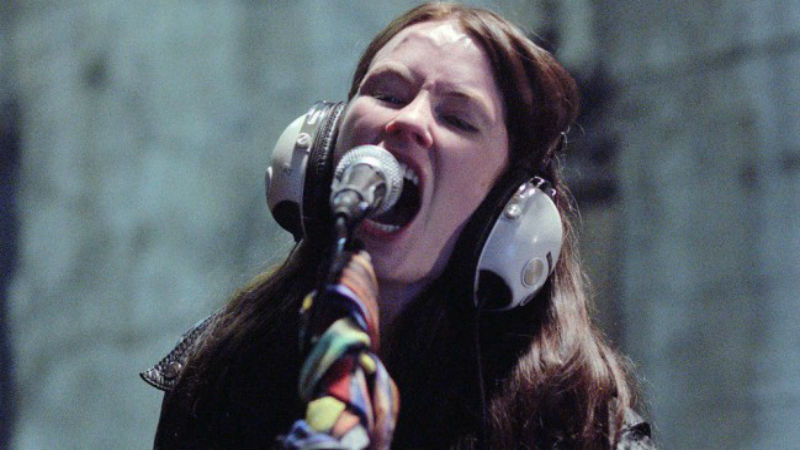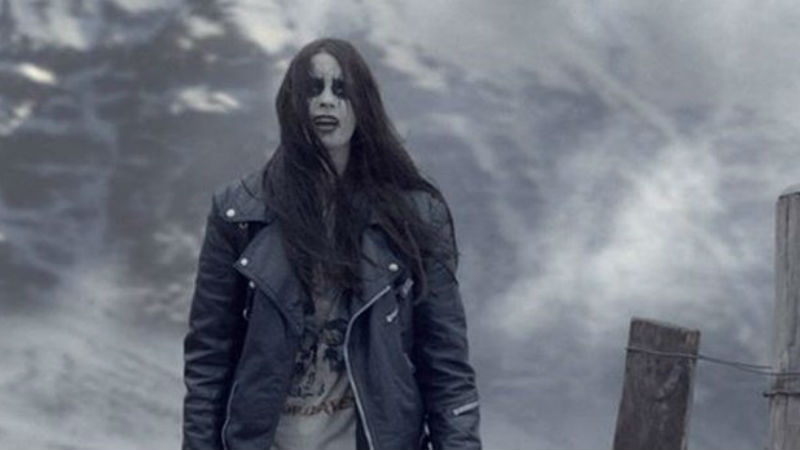Tragedy befalls a rural Icelandic farming family when son Baldur (Óskar Logi Ágústsson), summoned for dinner by younger sister Hera (Diljá Valsdóttir), falls off the tractor into the threshing device he’s towing. A chunk of flesh comes off and there’s a surprisingly small amount of blood. The sequence is not perfect: had it been far more explicit with more blood, gore and medical detail, that would have fitted with the film’s subsequent investment in the excesses of heavy metal music.
The family predictably goes into shock and at the church funeral Hera glowers at a painting of Jesus. She deals with her loss by (1) adopting her brother’s metal band T-shirts, leather jackets and trousers (which, unbelievably, fit her perfectly) and burning all her own, very ordinary, young girl’s clothes, (2) listening to his heavy metal record collection and (3) playing metal riffs on his guitar and amp. She tries to leave the area for Reykjavik, but at the stop can’t bring herself to board the bus. After a few years, Hera is still living in the area as a metal-obsessed and -garbed teenager (Thora Bjorg Helga) and the guitar has inexplicably turned into a Flying V.

Neither of Hera’s parents have coped well. Her mum Droplaug (Halldóra Geirharðsdóttir) retains the dead boy’s room as if he were still alive while her dad Karl (Ingvar Eggert Sigurðsson) blames himself for not putting a cover on the driveshaft. They’re pretending everything’s fine when it really isn’t and their relationship has grown cold. They’re also failing to meet the spiritual/emotional needs of their teenage daughter – not the easiest of tasks at the best of times and one made much worse by all three surviving family members’ repression of their tragedy.
Subplots involve Hera’s childhood friend Knútur (Hannes Óli Ágústsson) whose platonic relationship soon turns more physically sexual and newly arrived parish priest Janus (Sveinn Ólafur Gunnarsson) who bonds psychically with the girl when she learns he not only likes all the bands she does but also has a metal tattoo on his shoulder. The latter wisely rejects her attempts to throw herself at him.

The film has a few glimmering moments. An early meal time scene has mother glower at daughter while some tomato sauce hangs off the edge of Hera’s plate like blood in a still from an unmade horror film festering in the back of the writer-director’s mind. And the hand of a small kid in a metal T-shirt makes a respectful Sign of the Horns to Hera in a local shop.
There is much to admire in the portrait of a small village where community and Christian religion are woven together to everyone’s benefit, although viewers may wince at the way when Hera moves in with Knútur she suddenly abandons the leather jackets in favour of the more conservative woolly jumpers and outdoor weather jackets that everyone else wears. As if to say, in this community you need to conform, it’s unacceptable to be that little bit different.
Metalhead is available to stream on all major VoD platforms, and is part of the Walk This Way collection.









